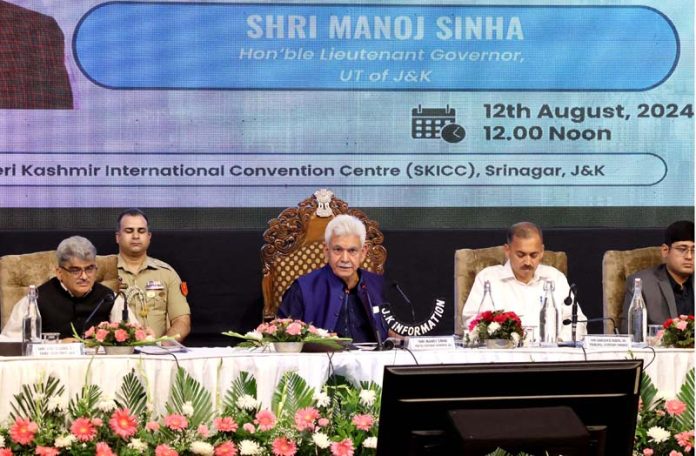
Repaid power debt of Rs 28000 crore
Fayaz Bukhari
SRINAGAR, Aug 12: Lieutenant Governor Manoj Sinha today said that with the support of the Centre, the administration has managed to move Jammu and Kashmir out of its debt issues and place it on a path towards economic sustainability.
Follow The Daily Excelsior Channel On WhatsApp
Sinha told a news conference here in Srinagar that J&K had previously been recognized as a “debt State.” However, over the past five years, efforts have been directed at making the region self-reliant.
Click here to watch video
The LG described the last 5 years as a period marked by peace, prosperity, and high hopes. He highlighted the record voter turnout of 58 percent in the Lok Sabha elections as a significant achievement of his administration.
“There has been notable improvement in several sectors, including power, agriculture and infrastructure,” he said.
The LG emphasized that there has been no increase in power tariffs over the past three years, and electricity rates in J&K remain lower compared to Punjab, Himachal Pradesh and Haryana. He said there has been 25 percent reduction in transmission and distribution losses.
Sinha said that J&K faced major challenges of the 2014 floods and the COVID-19 pandemic which led to significant hurdles in infrastructure development.
He highlighted the turnaround of J&K Bank, which has shifted from being heavily indebted to becoming a profitable institution.
The LG said that since the abrogation of Article 370 in 2019, J&K has undergone a profound transformation. “We have seen remarkable growth in tourism, significant improvements in electricity infrastructure, and a turnaround in the financial health of J&K Bank. These changes reflect a broader, positive shift across various sectors and underscore a period of substantial progress and development for Jammu and Kashmir.”
He said that J&K administration has been able to pay a huge power debt bill. He said that his administration had got huge power debts worth Rs 28000 crore as a legacy. “We have been able to repay it,” he said.
“People must cooperate with us and pay for the power they use so that we can ensure 24×7 power for them,” he said, adding that the metering has been a successful step to prevent power theft.
Sinha said Jammu and Kashmir’s GSDP is expected to grow at 7.5 per cent during the current fiscal.
“The GSDP (Gross State Domestic Product) for 2024-25 has been projected at Rs 2,63,399 crore (Rs 2.63 lakh crore), showing a growth of 7.5 per cent over the GSDP of 2023-24,” he said.
Highlighting the budget’s salient features, he said the size of provisions this fiscal was Rs 30,889 crore higher than the previous year.
“The size of the budget for 2024-25 is Rs 1,18,390 crore (Rs 1.18 lakh crore). It is Rs 30,889 crore higher than the expenditure of 2023-24,” he added.
Giving details, the lieutenant governor said the revenue receipt estimate for 2024-25 was Rs 98,719 crore and capital receipt estimate Rs 19,671 crore.
Revenue expenditure for 2024-25 is pegged at Rs 81,486 crore.
The administrative sector has got Rs 9,881.68 crore, social sector Rs 24,870.50 crore, infrastructure sector Rs 15,719.40 crore and the economic sector Rs 5,555.48 crore, Sinha said.
“Capital expenditure (or developmental expenditure) for 2024-25 is Rs 36,904 crore,” the Lieutenant Governor added.
While the capital expenditure contribution towards GDP is 14.01 per cent, the tax-GDP ratio is projected at 7.92 per cent, which is higher than last year’s 5.68 per cent, he told reporters.
Sinha said Jammu and Kashmir had left behind the era of fiscal mismanagement due to externally-sponsored terrorism and added that the high levels of committed expenditure and ATC (aggregate technical and commercial) losses in the power sector had accentuated the challenge of managing the Union Territory’s finances.
“Over the past year, the Union Territory Government stressed on revenue augmentation, improving project execution, reducing ATC losses, and improving quality of governance,” he added.
The Union Territory Government improved GST return compliance, initiated an e-Stamping system, expanded dealer registration and conducted transparent excise auctions as part of efforts to augment revenue, he further said.
“Tax revenue increased from Rs 12,753 crore in 2022-23 to Rs 13,900 crore in 2023-24. GST collection rose 12 per cent and excise collection increased 39 per cent in the 2023-24 fiscal against 2022-23,” the LG added.
The Union Territory Government’s efforts to undertake metering and improve billing and collection efficiency resulted in non-tax revenue increasing from Rs 5,148 crore in 2022-23 to Rs 6,500 crore in 2023-24, Sinha said.
The administration has effectively leveraged centrally-sponsored schemes and intensified efforts to harness central funds through faster execution of works, he said.
“This led to a sharp increase in receipts of funds under centrally-sponsored schemes from Rs 6,400 crore in 2022-23 to Rs 10,300 crore in 2023-24,” according to the LG.
During the past few years, the Union Territory government improved budgetary transparency. It also repaid power sector dues of about Rs 28,000 crore, which was pending and rising for several years, he said.
For the first time in 77 years, the Union Territory contributed to the contingency funds created by the Reserve Bank of India such as the Consolidated Sinking Fund and the Guarantee Redemption Fund, he added.
Sinha said the administration had stopped borrowings and significantly paid off previous dues.
“These initiatives, coupled with the judicious welfare measures and infrastructure development, helped the state GDP double from Rs 1.17 lakh crore in 2015-16 to Rs 2.45 lakh crore in 2023-24. The state GDP is expected to touch Rs 2.63 lakh crore in 2024-25,” he said.
The Centre has acknowledged these financial management improvements as well, he claimed.
“Accordingly, in the financial year 2024-25, the Union Government has approved a special assistance package of Rs 17,000 crore for Jammu and Kashmir,” Sinha said.

